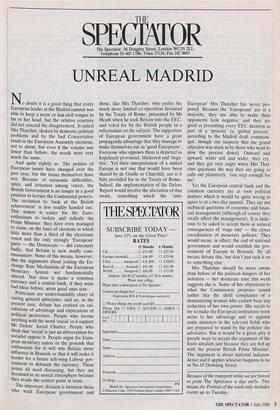S P ECTAT THE OR
The Spectator, 56 Doughty Street, London WC1N 2LL Telephone 01-405 1706; Telex 27124; Fax 242 0603
UNREAL MADRID
No doubt it is a good thing that every European leader at the Madrid summit was able to keep a more or less civil tongue in his or her head, but the relative courtesy did not conceal the disagreement. It suited Mrs Thatcher, shaken by domestic political problems and by the bad Conservative result in the European Assembly elections, not to shout; but even if the volume was lower than before, the words were very much the same.
And quite rightly so. The politics of European issues have changed over the past year, but the issues themselves have not. Because of economic difficulties, splits, and irritation among voters, the British Government is no longer in a good position to lecture the Continental powers. The invitation to `look at the British achievement' is less readily handed out. This makes it easier for the Euro- enthusiasts to isolate and ridicule the Prime Minister: they have even managed to claim, on the basis of elections in which little more than a third of the electorate voted and the only strongly 'European' party — the Democrats — did extremely badly, that Britain is now madly corn- munautaire. None of this means, however, that the arguments about joining the Ex- change Rate Mechanism of the European Monetary System are fundamentally altered. Nor does it make a common currency and a central bank, if they were bad ideas before, seem good ones now. Politicians are understandably chary of raising general principles, and so, in the present case, debate has centred on cal- culations of advantage and expressions of political preference. People who favour anything with the word `social' in it support Mr Delors' Social Charter. People who think that `social' is just an abbreviation for socialist oppose it. People argue for Euro- pean monetary union on the grounds that enthusiasm for it will win Britain more influence in Brussels or that it will make it harder for a future left-wing Labour gov- ernment to debauch the currency. These points all need discussing, but they are discussed in an unreal atmosphere because they evade the central point at issue.
The important division is between those who want European government and those, like Mrs Thatcher, who prefer the much more limited co-operation favoured by the Treaty of Rome, presented by Mr Heath when he took Britain into the EEC, and voted for by the British people in a referendum on the subject. The supporters of European government have a great propaganda advantage that they manage to make themselves out as 'good Europeans'. Everyone who opposes them is depicted as hopelessly provincial, blinkered and 'nega- tive'. Yet their interpretation of a united Europe is not one that would have been shared by de Gaulle or Churchill, nor is it fully provided for in the Treaty of Rome. Indeed, the implementation of the Delors Report would involve the alteration of that treaty, something which the `anti- European' Mrs Thatcher has never pro- posed. Because the `Europeans' are in a majority, they are able to make their opponents look negative; and they are good at presenting every EEC decision as part of a 'process' (a `global process', according to the Madrid draft communi- qué, though one suspects that the grand adjective was stuck in by those who want to slow the process down). Onward and upward, wider still and wider, they cry, and they get very angry when Mrs That- cher questions the way they are going or calls out plaintively, `one step enough for me'.
Yet the European central bank and the common currency are at root political matters which it would be quite wrong to agree to at a two-day summit. They are not technical questions of economic and finan- cial management (although of course they vitally affect the management). It is ludic- rous to be asked to accept them as natural consequences of `stage one' — the closer coordination of monetary policies. They would mean, in effect, the end of national government and would establish the gov- ernment of Europe in Brussels. By all means debate this, but don't just tack it on to something else.
Mrs Thatcher should be more aware than before of the political dangers of her isolation -- her moderate tone this week suggests she is. Some of her objections to what the Commission proposes sound rather like the shrill complaints of a domineering woman who cannot bear any reduction of her own power. She needs to try to make the European institutions work more to her advantage and to appoint some ministers in the relevant fields who are .prepared to stand by the policies she advocates. But it would be a great pity if people were to accept the argument of the Euro-idealists just because they are fed up with the present British Prime Minister. The argument is about national indepen- dence and it applies whoever happens to be in No.10 Downing Street.










































 Previous page
Previous page